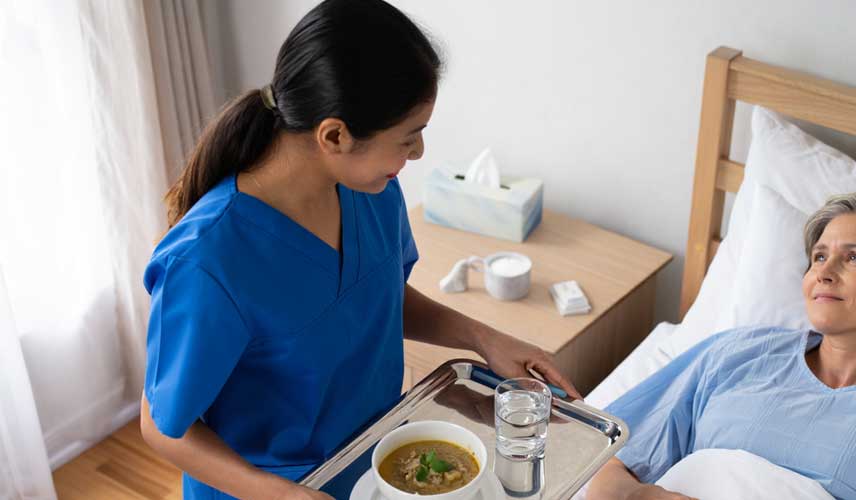
What Should Those Looking for Live-in Caregivers Pay Attention To?

As our loved ones age or experience a health issue, their care becomes a priority. Especially in cases where constant supervision and professional support are needed, the search for live-in caregivers often comes to the forefront for many families. Receiving care in the comfort of one's own home, in a familiar environment, can positively contribute to the patient's recovery process and enhance their quality of life.
However, selecting a live-in caregiver to whom you will entrust the health, safety, and peace of your loved ones is an extremely sensitive and meticulous process. Finding the right candidate depends not only on professional skills but also on empathy, reliability, and personality compatibility. So, what should you pay attention to when making this important decision, and how can you find the most suitable live-in caregiver for your loved ones? In this comprehensive guide, we will thoroughly examine all the important points you should consider in your search.
Why is Live-in Caregiver Support Necessary at Home?
Live-in caregiver services provide significant convenience and assurance in various situations:
-
Continuous Supervision and Support: Provides uninterrupted supervision, especially for individuals who are bedridden, have dementia, or require 24-hour care.
-
Personal Care Needs: Offers professional assistance with daily personal care needs such as bathing, dressing, and toileting.
-
Medication Tracking: Ensures medications are taken regularly and in the correct dosage, and monitors potential side effects.
-
Health Status Monitoring: Observes changes in the patient's overall health status (fever, blood pressure, wound condition, etc.) and reports to relevant individuals (family, doctor) when necessary.
-
Home Comfort and Safety: Ensures the patient stays in their own home, in a familiar and safe environment, eliminating the alienating effects of hospitals or nursing homes.
-
Support for the Family: Alleviates the physical and emotional burden on family members, providing them with time and opportunities for rest.
-
Moral and Motivation: The caregiver's empathetic and positive approach boosts the patient's morale and contributes to the recovery process.
-
Emergency Management: Can intervene quickly and accurately in unexpected emergencies.
1. Clearly Define the Patient's Needs: Scope of Care and Your Expectations
Before starting the search for a caregiver, you must clearly outline the health status, needs, and expectations of the person who will be cared for. This is the fundamental step in finding the right candidate.
-
Health Status and Special Needs:
-
The patient's diagnosis and condition (e.g., dementia, stroke, cancer, bedridden, diabetes, etc.).
-
What medical devices (oxygen concentrator, catheter, etc.) does the caregiver need to be knowledgeable about and manage?
-
How critical is medication tracking and management?
-
How much physical assistance is needed? (Getting up, walking, feeding, toileting, etc.)
-
Are special medical procedures such as wound care or colostomy care required?
-
Is there a special diet or nutrition plan?
-
Personal Care Needs:
-
Daily personal hygiene needs such as bathing, toileting, dressing, and oral care.
-
Situations such as changing diapers and incontinence care.
-
Household Responsibilities:
-
Will the caregiver only provide patient care, or will there be additional tasks such as cleaning the patient's room/area, preparing meals? (This situation usually affects salary and expectations.)
-
Will they be expected to run errands such as grocery shopping or pharmacy tasks?
-
Social and Emotional Support:
-
Do you expect the caregiver to assist the patient in participating in social activities such as chatting, reading books, or playing games?
-
What should their approach be regarding keeping the patient's morale high and providing psychological support?
-
Emergency Management:
-
What procedures should they follow in an emergency (e.g., falling, shortness of breath, fainting)? (Calling 112, notifying the family, etc.)
-
Accommodation Conditions: Where will the caregiver stay in the house, will they have a private area, and what is the comfort level of this area?
-
Budget: The budget you can allocate for this service will significantly shape your search.
This detailed needs list will outline the right caregiver profile for you and ensure that potential candidates clearly understand your expectations.
2. Research Reliable Sources: Where to Find?
Turning to reliable and verified sources in the search for a live-in caregiver is vital.
-
Professional Caregiver Consulting and Human Resources Agencies: Agencies specializing in patient care typically have a wide pool of experienced candidates with verified references and completed health checks. These agencies also assist in obtaining documents such as criminal records and health reports and help you manage legal processes.
-
Advantages: Reliability, legal assurance, a wide range of candidates, the possibility of providing backup personnel, customer service support.
-
Disadvantages: Costs may be slightly higher compared to individual searches.
-
Hospitals and Health Institutions: Some hospitals or organizations providing home health services may recommend caregivers they know or have agreements with.
-
References and Recommendations: Recommendations from trusted friends, doctors, social service professionals, or acquaintances who have previously received similar services are invaluable. References based on personal experiences provide important insights into the candidate's reliability and compatibility.
-
Online Platforms and Job Advertisements: You can also post ads through some online platforms or social media groups. However, in this method, you need to research the candidates' backgrounds and references in much more detail and meticulously.
-
Advantages: A wide pool of candidates, direct communication opportunities.
-
Disadvantages: The responsibility for verifying candidates and their reliability falls on you, with risks of fraud.
3. Experience, Certifications, and References: Professionalism and Assurance
The candidate's experience, training, and references from previous employers will provide you with clear information about the caregiver's competence and reliability.
-
Experience and Areas of Expertise: It is a significant advantage if the candidate has previously worked with individuals with similar health conditions (e.g., dementia, stroke patients, bedridden patients, etc.). Having experience suitable for the patient's special needs is crucial.
-
Education and Certifications: Always inquire about the training and certifications they have received in areas such as patient care, first aid, and elderly care. Documents like the "Patient and Elderly Care Certificate" approved by the Ministry of National Education are important.
-
Reference Check: Always obtain written or verbal references from previous employers. Contact references by phone to gather detailed information about the candidate's punctuality, reliability, honesty, communication with the patient, attitude in emergencies, and overall satisfaction.
-
Health Report: Request an up-to-date and detailed health report from the candidate. Especially ensure that they do not carry infectious diseases.
-
Criminal Record: Always inquire about the criminal record. A clean criminal record is essential for a reliable caregiver.
4. Personal Characteristics and Character Compatibility: Empathy and Peace
Since the caregiver will be the person closest to your loved ones, their personal characteristics and compatibility with the patient are of vital importance.
-
Empathy and Patience: It is crucial for the caregiver to have a personality that can understand the patient's condition, empathize with their pains or difficulties, and possess patience. Patience is an indispensable quality, especially in cases like dementia.
-
Calmness and Composure: They should be able to maintain their calm in unexpected health issues or emergencies, not panic, and make correct decisions.
-
Communication Skills: They should be able to establish effective, respectful, and transparent communication with both the patient and family members. They should clearly and timely report any changes or concerns regarding the patient's condition.
-
Hygiene and Order: They should pay attention to both their personal hygiene and the cleanliness and order of the area where the patient lives.
-
Positive Approach: Having a positive energy positively affects the patient's morale and motivation.
-
Reliability and Honesty: It is a fundamental expectation for them to have a character that you can fully trust, both materially and spiritually.
-
Observation Skills: They should have good observation skills to notice small changes in the patient's condition or unusual situations.
5. Interview Process: Ask the Right Questions and Observe
In interviews with potential caregiver candidates, it is essential to ask the right questions to understand both their professional skills and personal characteristics and to make careful observations. If possible, involving the patient in this interview process helps you understand whether a mutual chemistry is formed.
Sample Interview Questions:
-
"What health conditions have you worked with before? Do you have experience specifically with [mention your patient's condition]?"
-
"What approach do you take in a patient's daily personal care (bathing, dressing, etc.)?"
-
"What is your experience with medication tracking? What methods do you use to avoid mixing up medication doses?"
-
"What steps do you take in an emergency (e.g., patient falling, shortness of breath)? Do you have first aid knowledge?"
-
"What do you pay attention to in communication with the patient? How do you handle situations that test your patience?"
-
"How do you support the patient's social activities (reading books, chatting, etc.)?"
-
"What are your expectations regarding living conditions and the home environment?"
-
"How important is confidentiality to you? What is your approach to private information at home?"
-
"Can you share your references and health report?"
-
"What are your salary expectations? How do you handle compensation for overtime or special situations?"
During the interview, observe the candidate's body language, eye contact, calmness, and the sincerity of their responses to the questions.
6. Trial Period and Contract Details: Transparency and Legal Guarantees
After finding the right candidate, establishing legal and financial details transparently ensures a smooth working relationship that protects the rights of both you and the caregiver.
-
Trial Period: Set a trial period in accordance with the Labor Law (usually 2 months). During this time, both you and the caregiver can get to know each other and assess compatibility.
-
Salary and Additional Payments: Clarify the caregiver's monthly salary, overtime pay, and additional payments such as travel and meals (if meals will be provided separately). Discuss all these costs upfront.
-
Working Hours and Leave: Clearly define the daily/weekly working hours, sleep and rest periods, weekly days off, and annual leave durations for the live-in caregiver. Discuss the working situation and compensation during official holidays as well.
-
Social Security: Ensure that the caregiver's SGK registration, insurance, and other legal obligations are fully met. Remember that employing illegal workers has legal penalties.
-
Contract: Create a detailed written contract that complies with the law and includes all these conditions. The contract should cover job description, working hours, salary, leave, accommodation conditions, confidentiality clause, termination conditions, and other important details. If the candidate is a foreign national, work permits and legal procedures should also be specified in the contract.
-
Emergency Communication: The contract or a separate document should clearly state whom to contact in emergencies, how to reach them, and what procedures to follow.
Tips for Compatibility and Continuity: A Peaceful Care Environment
After finding the right caregiver, there are things you can do to ensure the sustainability and efficiency of the relationship:
-
Open and Respectful Communication: Always maintain open, transparent, and respectful communication with the caregiver. Convey your concerns or changes regarding the patient's condition or care processes in a constructive manner.
-
Feedback: Provide regular and constructive feedback about the quality of care. Appreciate both the positive aspects and gently point out areas for improvement.
-
Create a Trusting Environment: Make the caregiver feel that you trust them. A safe and respectful working environment encourages them to be more committed to their job.
-
Comfort of Living Space: Ensure that the living space where the caregiver will stay is clean, organized, and has adequate comfort. This is important for their motivation and well-being.
-
Respect for Privacy: Respect the caregiver's own private living space and privacy.
-
Balance of Rights and Responsibilities: Balance the caregiver's rights and responsibilities with your expectations. Be a fair and equitable employer.
-
Motivation and Appreciation: Appreciating well-done work, increasing their motivation with small gestures or verbally, helps you establish a long-term working relationship.
The search for a live-in caregiver is one of the most important decisions you will make for the health and quality of life of your loved ones. Do not rush through this process; take each step meticulously and carefully. From clarifying the patient's needs to researching reliable sources, from detailed interviews to legal contracts, every stage is the key to finding the right, reliable, and compatible caregiver.
Remember, a good caregiver not only meets physical needs but also keeps the patient's morale high, provides peace to the family, and enhances the quality of life. This careful selection process will provide a safe, comfortable, and compassionate care environment for your loved ones.
Useful Information Other Content in the Category

Useful Information
2026 Evde Bakım Maaşı Ne Kadar Olacak?

Useful Information
Tuzla Private Driver Job Listings

Useful Information
Esenyurt Private Driver Job Listings

Useful Information
Beykoz (Acarkent) Private Driver Job Listings

Useful Information
Umraniye Gardener Job Listings

Useful Information
Tuzla Gardener Job Listings

Useful Information
Silivri Gardener Job Listings

Useful Information
Sariyer Gardener Job Listings

Useful Information
Cekmekoy Gardener Job Listings

Useful Information
Buyukcekmece Gardener Job Listings

Useful Information
Beylikdüzü Gardener Job Listings

Useful Information
Beykoz Gardener Job Listings
Useful Information
The Most Searched Caregiver Company on Google in 2025: Damla Consultancy

Useful Information
What is a Shadow Teacher? A Vital Support Mechanism for Children with Special Needs

Useful Information
